Red Baron has visited Potsdam several times, so it was a déjà vu. But where I usually travel by train, the newspaper only offered a bus trip this time. From Freiburg to Potsdam by bus in eleven hours! That was clearly too much for me.

|
|
View from my Berlin hotel room: An ICE (Intercity-Express) is leaving the Hauptbahnhof (Central Station) for its final destination, Berlin Ostbahnhof. |

|
| Kale dish from right to left with Bratkartoffeln (German fries), Pinkel, Mettwurst, and Kassler. |
In the evening, I decided to eat Grünkohl at
Buschbeck's
in Berlin. A
Rode Grütt
(a red fruit dessert originally from Denmark) rounded my meal off. Kale is
rarely served in southern Germany, and then only poorly.
The following day, in the early afternoon, I arrived at the hotel in Potsdam and took a walk through the city. The weather was cold, but the sun shone as I strolled through the Christmas market.

|
| For noms, English is the lingua franca |
Avid readers of my blogs know that Red Baron is a Berliner Weiße (wheat beer) freak, always with a shot of green woodruff syrup. When I am in the Berlin region, I never miss an opportunity.
So I was all the more surprised to find that, besides the Weiße grün and rot (raspberry syrup), there is now also the Weiße gelb (apricot syrup). I tried it only once; it was awful.
Where, during my last visit, a large hole still remained on the site of the destroyed Potsdam Synagogue, the façade of the new synagogue, still partially hidden behind a construction fence, is impressive.
After a 12-hour drive, the bus passengers arrived at the hotel late in the evening, where we enjoyed dinner together.
The following morning, the bus was waiting for the group to take us on a city tour. Our guide, Mr. Müller, excelled at rapid-fire storytelling, covering 200 years of Prussian history in a single sentence.

|
|
An axis of vision in Potsdam's New Garden shows, in the middle ground, a
pyramid covering the ice cellar for the Marble Palace, which sticks out its tower in the background. |
We couldn't get into the exhibition, so I'll share some earlier pictures from summer days with my readers.

|
| His seat |

|
| The "silent" actors |

|
| Invitation to the world premiere of Die Nibelungen at the UFA-Palace on February 14, 1924. |
A night watchman led the group through Potsdam around several blocks in the evening.

|
The following morning, the group visited an exhibition of Edward Munch at the Museum Barberini. Red Baron will write a particular blog
about the outstanding painter.
The evening found us at the Rococo Court Theater in the New Palace, situated in Sanssouci Park.
The performance was Der Schauspieldirektor (The Theater Director), a two-act musical comedy by Wolfgang Amadeus Mozart.

|
| Old Fritz (Frederick the Great) created it all. |
Still, with the telephoto lens on my iPhone 15 Plus Max, I had a new perspective on the famous mill behind Sans Souci Castle.
And the potatoes were there on Frederick the Great's tomb, honoring him for his forced introduction of this staple food in Prussia.

|
| Click on the photos to enlarge. |
In the afternoon, everybody prepared for the long evening. We had a buffet
dinner on a ship where no fireworks were allowed.
Red Baron made it to Luisenplatz, where our hotel was located, just in time to
experience the turn of the year. And then I had the fireworks of my life. The
square was a "hot spot." I was amid soaring rockets and exploding
firecrackers. It was breathtaking. Judge for yourself:
On New Year's morning, the group set off on its long trip from Potsdam
to Freiburg at 10 a.m. I was in awe of our bus driver, who managed to get us
back home in exactly 11 hours.
The only advantage of this long journey was that I was able to finish the 1000-page biography of Christoph Martin Wieland, the founder of modern German literature. Jan Philipp Reemtsma, a master of the German language, wrote a book that not only brings Wieland out of oblivion but also highlights Christoph Martin's contributions to German literature with great expertise. I will discuss the highlights of this excellent book in a future blog.
With this first blog in 2024, I wish all my readers not a good New Year but a
"better" one.
**





















No comments:
Post a Comment